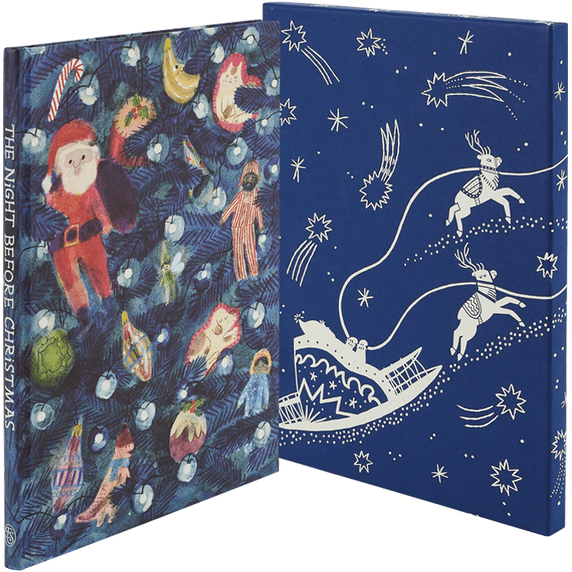
Beautifully illustrated by Ella Beech, this magical Folio Society edition of Clement C. Moore’s The Night Before Christmas will delight readers of all ages.
Illustrated by the author
Introduced by Stacy Schiff
Translated by Richard Howard
Commentary Volume by Christine Nelson
A definitive two-volume edition of Antoine de Saint-Exupery’s The Little Prince featuring his original and unforgettable illustrations.
All grown-ups were children first. (But few of them remember it)
The little prince lived on a very small planet, hardly any bigger than a house. Lonely on his tiny world, one day the prince, catching hold of a migration of wild birds, left on a journey across the stars to learn life’s mysteries of love, loss and beauty in a universe corrupted by grown-up logic. First published in 1943, and since translated into 270 languages and 26 different alphabets, few books have touched the world like Antoine de Saint-Exupéry’s modern fable The Little Prince. In its first Folio edition, this definitive two-volume production includes a new introduction by Saint-Exupéry’s biographer and Pulitzer Prize-winning author Stacy Schiff, as well as restored versions of Saint-Exupéry’s unforgettable illustrations, as inseparable from the story as the words themselves.
This edition won the Literature category at the British Book Design and Production Awards 2018.
Bound in blocked cloth
Set in Bembo Infant
112 pages
40 integrated colour illustrations
Printed endpapers
8¾˝ x 6¼˝
Commentary Volume:
Bound in blocked paper
80 pages
36 integrated colour illustrations
Blocked slipcase
8¾˝ x 6¼˝
One sees clearly only with the heart. Anything essential is invisible to the eyes
Already a best-selling French author and pioneering pilot, Saint-Exupéry wrote his most cherished work while in secluded, self-imposed exile in America after escaping the fall of France to the Germans in 1940. Yet, out of his despair, armed with a set of children’s watercolours and a typewriter, he created a story that was both a wide-eyed celebration of childhood adventure and a sombre, existential work of startling depth. An allegory for the French defeat, a meditation on the singularity of love or a personal note from the author on his own flickering innocence and disenchantment with the adult world? The message spoken by The Little Prince will forever remain a mystery. A year after its publication, Saint-Exupéry took off on a mission over the Mediterranean and disappeared, his body never to be found. In Schiff’s poetic words, the author and his prince would forever ’remain tangled together, twin innocents who fell from the sky’.
Before his doomed return to Europe, Saint-Exupéry left a working copy of the manuscript, including numerous illustrations not included in the first edition, with his friend Silvia Hamilton, in ’a rumpled paper bag’. The commentary volume to the Folio edition includes these preliminary sketches and drawings, accompanied by a page-by-page description by Christine Nelson, curator of the recent celebrated exhibition of the collection at New York’s Morgan Library and Museum.
With the book’s phenomenal success, Saint-Exupéry’s illustrations have suffered, slowly losing their colour and vitality over thousands of printings. Using a painstaking production process, Folio have used a 1943 edition held in the British Library to restore each image to its vibrant, original colouring. Turkish astronomers, marauding baobab trees and a single rose that exists nowhere else in the world all dance off the page as never before. As a nod to the book’s origins, and its resolutely Francophone author, the illustrations retain their French captions. The binding on the main volume is a striking yellow, with the unmistakable image of the prince staring out at the stars from his tiny home on Asteroid B-612, while the commentary volume is bound in blue in a rippling design by celebrated designer Paul Bonet used on an early French edition of the work.
Courtesy of BBD&P Awards
